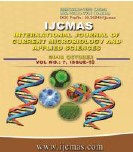


 National Academy of Agricultural Sciences (NAAS)
National Academy of Agricultural Sciences (NAAS)

|
PRINT ISSN : 2319-7692
Online ISSN : 2319-7706 Issues : 12 per year Publisher : Excellent Publishers Email : editorijcmas@gmail.com / submit@ijcmas.com Editor-in-chief: Dr.M.Prakash Index Copernicus ICV 2018: 95.39 NAAS RATING 2020: 5.38 |
Thirteen (Three gynoecious and ten monoecious) germplasm lines of cucumber (Cucumber sativus L.) were characterized by sodium dodecyl sulphate polyacrylamide vertical slab gel electrophoresis (SDS-PAGE). The seed protein could be resolved into total 11 bands distributed in 4 zones i.e. A, B, C and D. Zone A was divided into 5 subzones and 5 bands, zone B has 1 band C has 5 and zone D included 5 bands. Similarity index value ranged from 62% to 100% among all the genotypes. Pgyn-1 showed least similarity 68% with other genotypes. It was observed that all the gynoecious genotypes were dissimilar to monoecious genotypes. It was possible through seed protein profiles to distinguished morphologically similar genotypes. Hence, seed protein profiles proved useful in identifying gynoecious and monoecious lines of cucumber.
 |
 |
 |
 |
 |